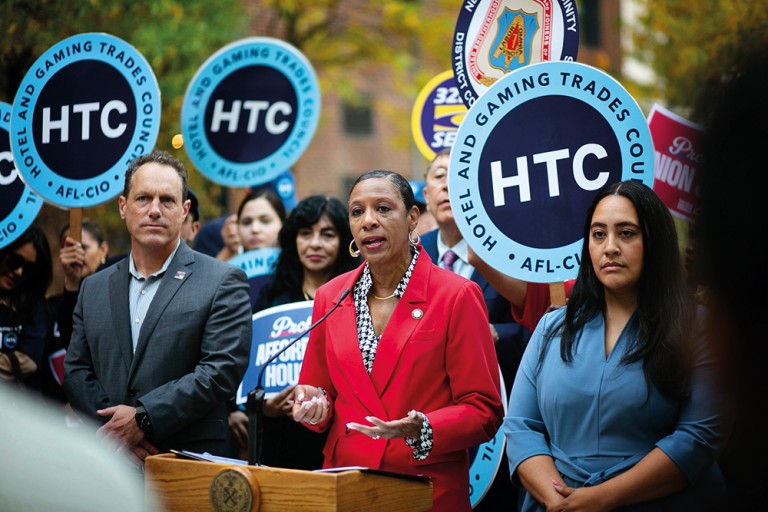By Michael V. Cusenza
On Tuesday, a coalition of City Council members, labor unions, and advocates warned New Yorkers about the misleading language and negative impacts of City Charter Revision Commission’s ballot proposals 2, 3 and 4 in the upcoming election.
The proposals would change who has the power to make decisions about development in Gotham, shifting voting power from communities’ democratically elected representatives to unelected appointees of the mayor, according to the council. However, the language describing the proposals on the ballot largely conceals this change, the City’s legislative body added.
The coalition warned that the changes advanced by the ballot proposals would erode community power that helps secure increased affordability in housing development, good jobs, and investments in neighborhood parks, schools, public transit, core infrastructure, and other essentials.
In July, the CRC released its interim final report, including five proposals that the panel may choose to put to Big Apple voters: four on housing and land use, and one on elections.
In its first question, the report proposes new fast track public processes for affordable housing. First, it would create a new action at the Board of Standards and Appeals that could grant relief from zoning for publicly financed affordable housing projects. It would also establish a new, streamlined public review procedure for applications that deliver affordable housing in the community districts that permit the least affordable housing, according to the CRC.
In its second question, the report proposed to create a new Expedited Land Use Review Procedure for certain land use changes.
In its third question, the report proposed replacing the mayor’s veto at the end of ULURP with a new Appeals Board, made up of the relevant borough president, the speaker of the City Council, and the mayor.
In its fourth question, the CRC proposed centralizing and digitizing the City Map.
In its fifth question, the report proposes moving the City’s primary and general election dates to even-numbered years, when presidential elections are held, to improve voter turnout, make local democracy more inclusive, and save taxpayer money.
“Through their democratically elected City Council, New Yorkers currently have the power to secure more affordable housing, neighborhood investments, and good union jobs, but that is at risk to Mayor [Eric] Adams’ misleading Ballot Proposals 2, 3, and 4,” said Council Speaker Adrienne Adams. “These proposals threaten to remove our communities’ ability to hold developers and the City accountable to deliver for the needs of working-class communities and our neighborhoods. Without communities’ voices and power in development decisions, our neighborhoods will get less affordable housing, less investment, and will be vulnerable to more gentrification. New Yorkers deserve to know the truth about what is at stake this election, and that’s why we will continue to inform voters about the true impacts of Mayor Adams’ misleading ballot proposals.”
Councilwoman Lynn Schulman (D-Forest Hills) added, “Our neighborhoods are strongest when the people who live in them have a real voice in shaping their future. These ballot proposals would take that voice away from communities and weaken the public’s ability to help guide how new housing and development fit into their neighborhoods.”

